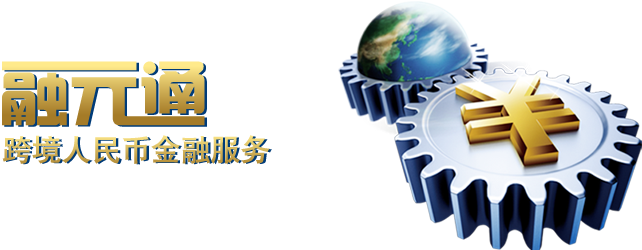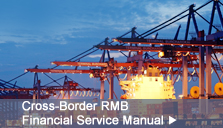
Case One
 Problem
Problem
A domestic corporate client is doing imports/exports with its trade counterparties mainly distributed in Europe. It hassigned trade contract denominated in USD with the counterparties. As the exchange rate of USD fluctuates sharply, the client and its counterparties have done forward transactions with banks respectively to lock exchange rate and evade exchange rate risk, but have increased financial costs therefore.
 BOCOM Service Solution
BOCOM Service Solution
We suggest the client and its counterparties settle in RMB and take advantage of the policy of RMB settlement supported by denomination in foreign currencies. The two parties agree on a RMB payment amount every time without revising the pricing currency of contracts, and then settlement can be done in RMB, to save the cost of forward transactions and financial costs.
Case Two
 Problem
Problem
A Chinese company has founded a project company abroad to run contract work. The project company finds itself difcult to gain funding from local banks with its own credit standing and under huge working capital pressure in the course of business operation.
 BOCOM Service Solution
BOCOM Service Solution
We suggest the company, with its excellent track record in BOCOM, ask BOCOM to provide guarantee to the project company for overseas financing. BOCOM issues a RMB financing L/G to an overseas bank. In this way, BOCOM helps the overseas project company get funding from local banks and successfully run contract work.
Case Three
 Problem
Problem
A foreign-invested enterprise encounters financial difculty at the start-up stage and cannot get sufcient RMB facility with its own credit records and therefore its development plan is in trouble.
 BOCOM Service Solution
BOCOM Service Solution
To make full use of the cross-border RMB business strength, we suggest the company avail itself of the credit resources of its overseas parent company and raise RMB fund /issue RMB bonds on the overseas RMB market. We design a one-stop service solution for the company, including overseas RMB investment banking +cross-border RMB financing +RMB inward remittance.
Case Four
 Problem
Problem
An overseas subsidiary of a Chinese company plans to purchase ships from China and want to get banking facility in consideration of capital turnover and utilization, but the subsidiary's credit standing abroad is not good enough to obtain mid-/long-term large-sum facility.
 BOCOM Service Solution
BOCOM Service Solution
After analyzing the contract on ship purchase signed by the subsidiary and given consideration to the special nature of shipbuilding industry, We provide legal advice, buyer risk management, credit financing, RMB NRA account and cross-border RMB settlement services based on the characteristics of the ship industry and profile of the two parties.
Case Five
 Problem
Problem
A company imports raw materials through its subsidiary in Hong Kong. In order to quicken capital turnover, the company wants to settle the payment on an O/A basis. But the overseas exporter doesn't have enough faith in the solvency of the Hong Kong subsidiary, rejects such payment terms and requests settlement by L/C. However, the Hong Kong subsidiary can hardly meet the requirements of local financial institutions and has difculty in opening L/C.
 BOCOM Service Solution
BOCOM Service Solution
A domestic branch, together with Hong Kong branch, designs cross-border RMB back-to-back L/C for this company. The domestic branch opens RMB usance L/C for the company. On the basis of this L/C, BOCOM Hong Kong branch opens L/C for the Hong Kong subsidiary, to meet the settlement requirements of the overseas exporter.
 Are all enterprises within the territory of China allowed to conduct cross-border RMB settlement?
Are all enterprises within the territory of China allowed to conduct cross-border RMB settlement?
All enterprises within the territory of China are allowed to conduct cross-border settlement in RMB for current items such as imports/exports of goods and services, RMB overseas direct investment and foreign direct investment and other capital items permitted by regulatory bodies.
 In which countries and regions other than China is cross-border RMB settlement allowed?
In which countries and regions other than China is cross-border RMB settlement allowed?
Cross-border RMB settlement is allowed in any country and region in the world. You only need to confirm that the counter-party is willing to accept RMB as the settlement currency.
 How does the trade counterparty use RMB in cross-border settlement?
How does the trade counterparty use RMB in cross-border settlement?
As long as the account bank of your trade counterparty opens a RMB vostro account with BOCOM or your trade counter-party opens a RMB NRA with BOCOM, settlement in RMB can be done.
 Can RMB export revenues of enterprises within the territory of China be deposited abroad?
Can RMB export revenues of enterprises within the territory of China be deposited abroad?
The Chinese regulatory body controls exports of goods in RMB through a Key Namelist under Supervision. Companies on the list are prohibited from depositing their RMB export revenues abroad. RMB export revenues of companies beyond the list can be deposited abroad, as long as some commercial bank sends relevant information to the RCPMIS of People's Bank of China on their behalf. The key Namelist is implemented by dynamic management and is updated in real time.
 Any change to export rebates when enterprises within the territory of China do settlement in RMB?
Any change to export rebates when enterprises within the territory of China do settlement in RMB?
When enterprises within the territory of China use RMB in export settlement, verification and writing-of of export revenues is not necessary, export revenues are not credited into pending accounts and the same export rebates as settle- ment in foreign currencies apply.
 Can the currency in customs declaration differ from settlement currency?
Can the currency in customs declaration differ from settlement currency?
When a foreign currency is used in customs declaration, RMB can still be used in settlement.
 Can entrepot trade be settled in RMB?
Can entrepot trade be settled in RMB?
Entrepot trade can also be settled in RMB.
 Can RMB fund be refunded (reimbursed) after paid /received?
Can RMB fund be refunded (reimbursed) after paid /received?
RMB fund can be refunded (reimbursed) after enterprises within the territory of China make or receive payment , but the amount refunded (reimbursed) is usually no higher than the original amount paid/received.
 Can off-shore RMB loan of foreign invested enterprises be used for domestic investment?
Can off-shore RMB loan of foreign invested enterprises be used for domestic investment?
Overseas RMB loan cannot be used for investing securities, derivatives, entrusted loan, financial products, non self use real estate.
related enterprises?
The interest, term and purpose for domestic enterprises lending of shore should be determined after the bilateral discus-sion by debtor and creditor within a reasonable range according to business principle.
 Does the off-shore RMB Debt could be back flowed into domestic market?
Does the off-shore RMB Debt could be back flowed into domestic market?
With approval by PBOC, enterprises could apply to the bank the RMB special saving account, which is only for saving the of shore RBM debt.
 Is there any limitation on size of RMB purchase and sale by off shore corresponding bank?
Is there any limitation on size of RMB purchase and sale by off shore corresponding bank?
In principle, the RBM purchase and sale business between domestic bank and of-shore corresponding bank, of-shore clearing bank and of-shore corresponding bank will not be imposed the limitation on size of annual end-of-day the cumu-lative net.







